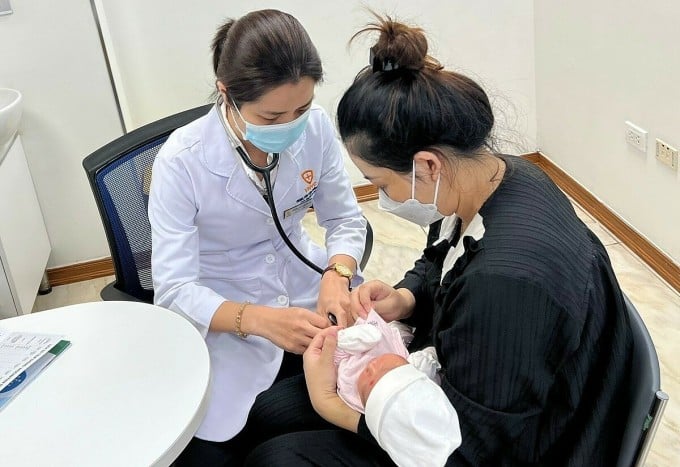Many hospitals nationwide have run out of the free hepatitis B vaccine for newborns, forcing parents to take their children to private clinics for vaccination.
The Hepatitis B vaccine is part of the National Expanded Immunization Program and is administered to infants on their first day of life at the hospital. Vaccination centers and medical facilities also offer this vaccination service, but for a fee.
In fact, most children receive their first dose of the vaccine free of charge within 24 hours of birth. Subsequently, according to the schedule, at 2, 3, 4, and 16-18 months of age, children need additional combination vaccines containing a hepatitis B component to achieve optimal protection.
The free Hepatitis B vaccine is a recombinant Gene-HBvax vaccine, manufactured by Vabiotech, a subsidiary of the Ministry of Health and a company specializing in vaccines and biological products. On September 28th, a representative from the Ho Chi Minh City Center for Disease Control and Prevention stated that this vaccine had run out since the beginning of September and they are awaiting supply from the National Institute of Hygiene and Epidemiology (Ministry of Health). This is also the general situation in other provinces and cities, as there is only one source of supply from the National Institute.
According to a vaccine expert (who wished to remain anonymous), due to complications in the procurement bidding process, orders cannot be placed, and there is currently no hepatitis B vaccine available for distribution to provinces and cities. The Ministry of Health and related units are urgently working to resolve the issues, and it is expected that supply will resume by November.
"However, if the mother has hepatitis B and the child is not vaccinated early, the risk of the child contracting the disease is very high," this expert said. Without a vaccine available within 24 hours of birth, children must wait until they are two months old to receive a combination vaccine that includes hepatitis B. This causes anxiety for many families. Many people bring their children to private vaccination centers to get vaccinated against hepatitis B, then take them back to the maternity hospital to stay with their mothers.
For example, on September 27th, Ms. Hoai, 58 years old, brought her one-day-old granddaughter to the VNVC Son Tay Vaccination Center ( Hanoi ) for vaccination. She said that her granddaughter was born at Son Tay General Hospital, and since the Hepatitis B vaccine had run out, the medical staff advised the family to take the baby for a private vaccination service. "I was worried that if the vaccination was delayed, the baby wouldn't have protective immunity, so after the umbilical cord was cut and the baby's health was stable, I took her to get vaccinated immediately," she said. After the vaccination, she took the baby back to the maternity hospital so the mother could breastfeed.

Administering the Hepatitis B vaccine to newborns at VNVC. Photo: Provided by the center.
The VNVC vaccination system in many localities has recorded a 50% increase in the number of infants and pregnant women coming to receive the Hepatitis B vaccine in recent days, "due to shortages in other places".
Dr. Bach Thi Chinh, Medical Director of the VNVC Vaccination System, stated that "24 hours after birth is the golden time to vaccinate children against hepatitis B to prevent hepatitis B virus infection and liver cancer," adding that this is a recommendation from the World Health Organization and the Ministry of Health.
Vietnam is a region with a high prevalence of hepatitis B (approximately 10-20% of the population). The rate of hepatitis B virus carriers in pregnant women is 10-16%, and in children 2-6%. About 30% of people with chronic hepatitis B will develop cirrhosis, and 5-10% will develop liver cancer. More than 60% of people with liver cancer have a history of hepatitis B.
According to Dr. Chinh, the injection given within 24 hours after birth can prevent 85-90% of the risk of mother-to-child transmission, while also protecting the child from other routes of hepatitis B transmission. If the injection is given later, the ability to prevent mother-to-child transmission will decrease. Specifically, if injected 7 days after birth, the ability to prevent mother-to-child transmission only reaches 50-57%.
If the mother has hepatitis B, in addition to vaccination, the child also needs to be given hepatitis B immunoglobulin within the first 12 hours after birth to neutralize the antigen transmitted from the mother.
Acute hepatitis B infection in newborns often presents with vague and easily mistaken symptoms such as yellow urine, jaundice, poor feeding, etc., affecting liver function. More than 90% of children infected with hepatitis B in infancy will develop chronic hepatitis B in childhood or adulthood. Symptoms include jaundice, lethargy, poor responsiveness, slow weight gain, abdominal distension, etc.
Doctors recommend that pregnant women get vaccinated against hepatitis B during and before pregnancy to protect their babies. Women planning to become pregnant need three doses within six months and should complete the vaccination schedule at least one month before conception. If a woman becomes pregnant before receiving all three doses, she can continue vaccinations during pregnancy as directed by her doctor. In some developed countries, where the prevalence of hepatitis is low and mother-to-child transmission is not the primary route, the hepatitis B vaccine is administered very early, even within the first 12 hours after birth.
Since last year, the supply of many vaccines in the expanded immunization program has been disrupted, sometimes for months, such as the measles vaccine, DPT (a combination vaccine against diphtheria, pertussis, and tetanus), and DPT-VGB-HiB (a 5-in-1 vaccine against diphtheria, pertussis, tetanus, hepatitis B, Hib pneumonia, and Hib meningitis)...
The shortage is due to procedural obstacles related to procurement regulations, particularly concerning pricing. The situation is exacerbated by new regulations, which stipulate that from 2023 onwards, the Ministry of Finance will no longer allocate budget to the Ministry of Health for procurement. Instead, it is proposed that the Ministry of Health implement budget decentralization regulations, meaning localities will independently procure supplies to meet their own needs. Unable to find suppliers and concerned about price discrepancies, many provinces and cities have suggested that the Ministry of Health continue to handle procurement, with the costs borne by the localities, but this proposal has not been approved.
The Expanded Immunization Program is a free, national immunization program that protects children from several common and highly fatal infectious diseases such as tuberculosis, diphtheria, pertussis, tetanus, polio, hepatitis B, measles, Japanese encephalitis, cholera, typhoid fever, pneumonia, and Hib meningitis.
Le Nga - Le Phuong
Source link



![[Image] Lunar New Year 2026 is celebrated with great fanfare around the world.](https://vphoto.vietnam.vn/thumb/1200x675/vietnam/resource/IMAGE/2026/02/17/1771339826059_155b0e14cbf624b0045-2993-jpg.webp)














































































































Comment (0)